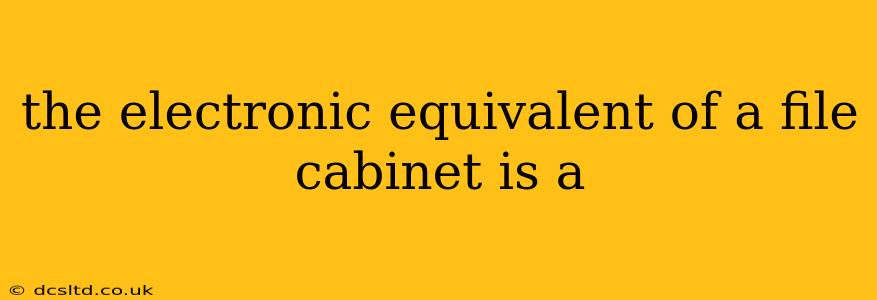The Electronic Equivalent of a File Cabinet: Exploring Cloud Storage and More
The electronic equivalent of a file cabinet isn't a single thing, but rather a range of technologies designed for digital document storage and management. While the simple answer might seem to be "cloud storage," the reality is more nuanced. The best equivalent depends on your specific needs and how you use a physical file cabinet. Let's explore the different options and their functionalities:
What are the different types of electronic file cabinets?
This question highlights the need to consider various aspects of digital storage. We're not just talking about storing files; we need to think about accessibility, security, organization, and collaboration features. Therefore, several options fill the role of an electronic file cabinet, each with its strengths and weaknesses:
-
Cloud Storage Services (e.g., Google Drive, Dropbox, OneDrive): These are probably the closest equivalent to a readily accessible file cabinet. They offer centralized storage, accessible from multiple devices. You can organize files into folders, mirroring the physical filing system. However, you're relying on a third-party provider for security and data integrity.
-
Network Attached Storage (NAS) Devices: A NAS device is a physical device on your local network that acts as a centralized storage point. It offers more control over your data than cloud storage, and can be faster for local access. However, it requires setup and maintenance, and access is generally limited to devices on your network.
-
Local Hard Drives/SSDs: These are the simplest form of electronic storage, akin to having a single file cabinet in your office. They provide direct and fast access to your files, but lack the accessibility and redundancy of cloud or NAS solutions. Data loss is a significant risk if the drive fails.
-
Enterprise Content Management (ECM) Systems: For larger organizations, ECM systems offer sophisticated document management, including version control, workflow automation, and advanced search capabilities. They are far more complex than a simple file cabinet but provide much more functionality.
What is the best electronic equivalent for file management?
The "best" option depends heavily on your specific needs. Consider these factors:
-
Security: Cloud services typically offer robust security measures, but NAS devices offer more control over security protocols. Local drives offer the least security unless implemented with strong passwords and encryption.
-
Accessibility: Cloud storage offers the greatest accessibility, allowing access from anywhere with an internet connection. NAS is limited to your network, and local drives are only accessible from the computer they're connected to.
-
Cost: Cloud services typically involve subscription fees, while NAS devices require an upfront purchase. Local drives are the least expensive option initially.
-
Scalability: Cloud storage and NAS are more easily scalable than local drives. As your needs grow, you can easily upgrade your storage capacity.
-
Collaboration: Cloud storage often includes collaboration tools, allowing multiple users to access and edit files simultaneously. This is usually lacking in local storage solutions and requires more advanced setup in NAS.
Is cloud storage safe and secure?
Cloud storage providers employ various security measures to protect your data, including encryption, access controls, and regular security audits. However, no system is perfectly secure. Understanding the provider's security practices is crucial. Look for providers with strong reputations and transparent security policies. The level of security also depends on your own practices, such as using strong passwords and two-factor authentication.
How can I choose the right electronic filing system?
Carefully assess your needs before choosing a solution. Consider the factors mentioned above – security, accessibility, cost, scalability, and collaboration features – to determine which option best suits your workflow and budget. For individuals or small teams with simple needs, cloud storage might suffice. Larger organizations or those with high security requirements might prefer a NAS or ECM system.
In conclusion, the "electronic equivalent of a file cabinet" is a multifaceted concept. The best option depends on your specific needs, balancing accessibility, security, cost, and collaborative features to find the perfect digital filing system for your unique circumstances.
